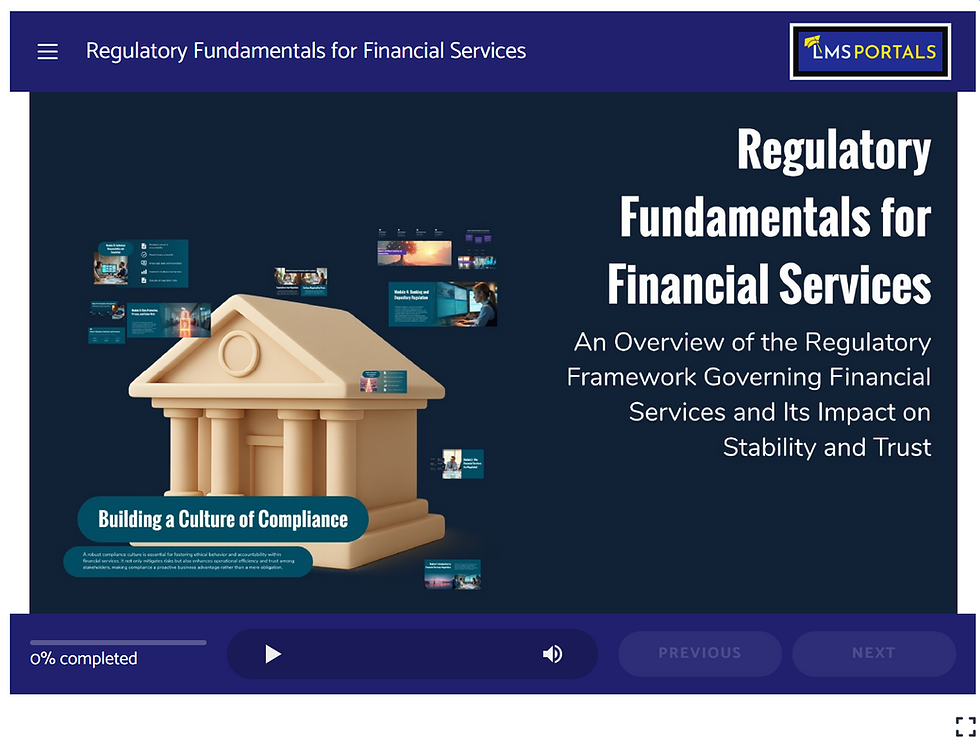A Cloud LMS for Financial Services Companies
- LMSPortals

- Aug 26, 2020
- 3 min read
Updated: Apr 25, 2021

While employee training and learning is critical for companies of all sizes and from all industries, it is particularly important that financial services firms invest in and develop effective training strategies for their workers. Training your financial services employees not only makes them more efficient and effective in their job roles, it also helps to ensure that your employees are operating within industry regulations and can enhance the value they bring to the firm and your clients.
In years past, the typical strategy for employee training by financial services firms was through classroom-based learning. But in recent years, as web-based technologies have continued to evolve, online learning (also known as “eLearning”) has emerged as the preferred approach. This is especially true for small and mid-sized financial services firms. And the foundational technology supporting these eLearning programs is the Learning Management system or “LMS”.
An LMS v. Classroom-Based Training
An LMS is the software application that supports all types of eLearning programs, including corporate training and employee development. And while an LMS can be deployed on-premises, this calls for a rather large, up-front investment (the kind of capital expense usually reserved for exceptionally large organizations) as well as the ongoing costs or management and maintenance of the system. Today, small and medium-sized businesses usually choose to go with a cloud-based LMS provided by a third-party vendor.
In addition to eliminating the need for a sizable initial spend, a cloud LMS offers users the ability to access their learning materials at any time and from any place. This level of availability can be extremely beneficial for busy financial services employees who need access to the right content at the right time. And today, most cloud-based LMS vendors offer their systems on a subscription basis, thus allowing your company to access (and pay for) only the features and capacity you need.
Finally, a cloud LMS offers a level of security and scalability that is very hard to achieve through an on-premises deployment.
Cloud LMS Use Cases for Financial Services Companies
While a cloud LMS can impact numerous areas of a financial services firm, some of the most common use cases tend to include:
New Hire Orientation
These are learning courses designed to help ensure the success of your new employees by providing them with all of the initial information they will need to operate successfully within your firm.
Skills Development
Financial services employees need to be well-trained in both “hard” skills (financial services systems, technologies, and methodologies), as well as “soft” skills (such as listening, communication, and problem-solving). It usually makes sense to make these types of training available to your employees on a role-specific basis.
Compliance
These are programs that are developed to create employee awareness regarding the financial services rules and regulations that are pertinent to your firm and to teach your employees how to operate successfully within these guidelines.
Sales and Customer Service Skills
The success of a financial services organization is largely dependent on the skills that your customer-facing employees develop. Given this, offering a variety of courses that will help your sales and service teams to more effectively perform their roles should be a critical piece of your training program.
LMS Portals: A Cloud LMS for Financial Services Companies
LMS Portals offers a cloud-based, multi-tenant LMS that allows our financial services clients to launch and manage multiple, private eLearning environments to support their training programs. In working with the LMS Portals system, administrators can launch private learning portals for various groups of employees, but also for partners and customers. And each portal you launch can have its own branding, user onboarding, collaboration and messaging, analytics, and more.
Visit our Partner Program pages to learn more or contact us today to get started
for free!



Comments